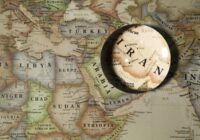Washington’s decision to enter war in Iraq for the third time in a quarter century is consistent with long-held US policy.
The debate over isolationism vs engagement is a relatively new one in American political history. No less than George Washington and John Quincy Adams warned Americans of entangling ourselves in permanent alliances and enlisting under foreign banners regardless of how seemingly righteous.
That seemed like good advice for the young nation for well over 100 years. Then there were the two World Wars. America hesitantly entered the first, exiting with a different attitude about the world and its potential new role in it. Still, as dark clouds gathered over Europe in the 1930s and a new, more assertive power rose in Asia, few Americans were inclined to insert themselves in what was clearly a prelude to war. So resistant was the country, that for most of the period leading up to World War II, the troop levels of US armed forces were kept at dangerously low levels. Not until 1940, after the defeat of France and when all-out war appeared inevitable, did the US ramp up its army. And then there was Pearl Harbor.
Among the many lessons America learned from its Pearl Harbor and World War II experiences were three that have become cornerstones of US foreign and national security policy. First, the US, as the only major combatant nation with its infrastructure and manufacturing base largely intact at war’s end, would have to step up and play a leadership role in the world. Second, its leadership efforts must strive to attain global stability through regional and international alliances. Third, the US must be prepared to confront its enemies abroad, as opposed to at home, so as to prevent another Pearl Harbor from ever happening again.
Isolationist voices persisted, nevertheless, but the threat of communism and a nuclear-armed Soviet Union convinced the majority of Americans that their country’s new role and its pro-active engagement abroad were the right course. Historically speaking, however, Americans have practiced isolationism much longer than engagement. And variations of the isolationist voice persist today, for example, urging American withdrawal from the Middle East and its current turmoil, as a recent article on Fair Observer argued.
Can Washington Afford to Withdraw?
Isolationism is indeed an easier argument to make. America is flanked by two great oceans and by two stable and peace-loving democracies, Canada and Mexico — a luxury no other great power in history has had. And, of course, the US has a long list of domestic problems still unresolved. Leave the world to its problems and concentrate on fixing our own at home.
But can a nation as large as the US afford to withdraw? Or is it even possible for America to simply make itself an equal among all nations? The answer to both is simply no, not even if the US wanted to do so.
Since World War II, the US has gone to war on 14 occasions — from Korea through the latest wars in Afghanistan and Iraq. That does not include dispatching US troops to far-flung locales to protect or rescue Americans, defend embassies or address humanitarian crises.
The lessons of World War II have become far more difficult in their application than in their adoption. They remain as relevant today as they were in 1945. As the lone superpower in the world, the US is the only nation that can initiate action, preferably with the support and help of other major powers, to address and help solve crises and, yes, even enforce order from time to time.
But must the US exercise a leadership role in every conflict or crisis? And what if the conflict presents little threat to US security interests but endangers the lives of hundreds of thousands of innocents? How does the US determine which crises or conflicts present a genuine threat? Does every conflict require US military force?
There is no overarching answer to such questions. International crises, conflict and discord rarely admit to simple, overarching solutions.
Since World War II, the US has gone to war on 14 occasions — from Korea through the latest wars in Afghanistan and Iraq. That does not include dispatching US troops to far-flung locales to protect or rescue Americans, defend embassies or address humanitarian crises. The American record in these is not flawless. Vietnam and Iraq stand out as two engagements in which American judgment was severely clouded, its estimate of the threat grossly exaggerated and understanding of the local political, cultural and historical context woefully inadequate. Americans paid the price for these errors — 58,000 lives lost in Vietnam and 4,500 in Iraq, tens of thousands more adversely impacted by physical and psychological wounds and trillions of Americans’ tax dollars spent. The toll on the countries themselves remains inestimable.
Bosnia, But Not Rwanda
Other engagements would appear to justify the post-World War II policy. Korea, the 1991 Gulf War, Bosnia in 1994-95 and Kosovo in 1999 all succeeded — with important help from NATO and other allies — in halting invading forces or stopping ethnic cleansing. The 1983 Grenada invasion ended the threat to Americans living and studying there.
There have been times when the US chose not to intervene, too. It turned back Saddam Hussein’s invasion of Kuwait in 1991, but merely condemned Vladimir Putin’s invasion and annexation of Crimea earlier this year. US and NATO forces prevented ethnic cleansing in Bosnia and Kosovo, but stood by during the Khmer Rouge’s 1978 genocide of nearly 2 million innocent Cambodians and the 1994 Rwandan genocide of 800,000 Tutsis. Why Bosnia but not Rwanda or Cambodia? American hands may have been clean but perhaps not their consciences.
And in the Middle East, where American policy has been challenged and criticized extensively, it has abjured military involvement in the various conflicts pitting Egypt, Jordan, Syria and the Palestinians against Israel, choosing instead to employ its no less formidable diplomatic and economic assets to address those crises. Again, the results have been mixed — Camp David in 1979 on the plus side, but the continuing Israeli-Palestinian conflict on the minus.
Successes do not offset failures. Rather, they call for a continuing debate and thorough reassessment of the policy and its implementation. While largely valid on the whole, the policy — exercising our unique global leadership role, pursuing global stability through alliances and confronting enemies abroad as opposed to at home — needs to be constantly evaluated. Also, the tools with which the US exercises the policy must be carefully considered.
What neither the US, nor any other nation involved in ousting IS has been able to articulate is: What comes next?
The primary reason the US can maintain this policy is because it is the only nation that is able to bring massive — even overwhelming — resources to a conflict or crisis. These may be diplomatic, economic, logistical or technological. They must also include our military assets.
The latter tend to be more controversial, especially as applied in some regions like the Middle East. But for the policy to be truly effective, and for the US to acquire the support and especially the respect and trust it needs to play its outsized role, it must be able to deploy its formidable military assets.
Another Round in Iraq
For the third time in a quarter century, America finds itself militarily involved in Iraq. Americans are understandably frustrated and exhausted. “Why us again?” they fairly ask?
If the US reengagement in Iraq is measured against the policy sketched above, then it appears justified. First, as a global leader with the resources, we can involve ourselves and bring about a positive outcome. That is not to be discounted since there are conflicts or crises whose outcomes we cannot necessarily affect — such as Putin’s annexation of Crimea.
Second, the US has been able to cobble together a coalition of more than 40 Western and Arab nations. That kind of unified force is almost indispensable in today’s world to any US engagement abroad, even though Americans bear the preponderance of the burden. The symbolic and political value of such a coalition, as long as it holds, is vital.
Third, the declared enemy, the Islamic State (IS), like its ideological forbear — al-Qaeda — presents a danger both to us and our allies in the region. That argues for confronting and defeating the terrorist group in Iraq and Syria before it may strike further afield in countries such as Jordan, Saudi Arabia, Turkey and Lebanon, or further destabilize Iraq.
There are other motivating factors as well. The US bears some responsibility for Iraq’s current state. While the US did help establish a framework for democracy in Iraq — however fledgling it may be at present — it also inflamed deep-seated sectarian animosities. The US cannot hope to resolve those — it failed to do so after nearly nine years in Iraq — but it can help ensure that the worst elements of sectarianism, like IS, do not threaten the established order within the country or surrounding nations. Indeed, the US managed that, albeit too briefly, with the defeat of al-Qaeda in Iraq in 2009 as a result of the so-called surge.
A second motivating factor is humanitarian. When the US decided to deploy its air forces to the region in September, IS was poised to assault Kurdistan, whose inhabitants we had helped escape the depredations of Saddam following the first Gulf War. The US could not idly stand by and watch the tremendous advances of Kurdistan and the Kurdish people threatened. Also, IS had begun a campaign to kill or enslave the minority Yazidis of northwestern Iraq. It looked like genocide, and it was one that the US had the ability to prevent. So, Bosnia or Rwanda?
What the US cannot say at present is what happens when — though the matter of the “if” may not be entirely settled for a while — the Islamic State is defeated? Instability in Syria will remain, not to mention continuing sectarianism and division in Iraq. The US record in implanting democracies abroad is sketchy — Korea’s took decades, Iraq’s hangs by a thread and Vietnam’s failed disastrously.
So, it would seem on the face of it, there is a good case for American intervention — even military — to eliminate a terrorist organization whose negotiating terms are “capitulation or death.” What neither the US, nor any other nation involved in ousting IS has been able to articulate is: What comes next?
One should not necessarily forgo the first action — elimination of a ruthless and heedlessly violent organization threatening the lives of thousands and even millions — because of the inability to address the second. Rather, it argues for pursuit of the first and vigorous, simultaneous action to get those nations most directly involved in the conflict to answer the second question and supporting them in that effort.
The views expressed in this article are the author’s own and do not necessarily reflect Fair Observer’s editorial policy.
2 comments
Leave a comment
You must be logged in to post a comment.
Support Fair Observer
We rely on your support for our independence, diversity and quality.
For more than 10 years, Fair Observer has been free, fair and independent. No billionaire owns us, no advertisers control us. We are a reader-supported nonprofit. Unlike many other publications, we keep our content free for readers regardless of where they live or whether they can afford to pay. We have no paywalls and no ads.
In the post-truth era of fake news, echo chambers and filter bubbles, we publish a plurality of perspectives from around the world. Anyone can publish with us, but everyone goes through a rigorous editorial process. So, you get fact-checked, well-reasoned content instead of noise.
We publish 2,500+ voices from 90+ countries. We also conduct education and training programs
on subjects ranging from digital media and journalism to writing and critical thinking. This
doesn’t come cheap. Servers, editors, trainers and web developers cost
money.
Please consider supporting us on a regular basis as a recurring donor or a
sustaining member.
Will you support FO’s journalism?
We rely on your support for our independence, diversity and quality.







Simon Wood
May 31, 2015
Excellent article articulating justification for continued involvement. Part of the argument could be summarised as "we created this mess so its our responsibility now to try to clear it up". Missing from the article though is the word "oil". It presents America as a moral if sometimes mistaken "superhero" who is always determined to fight for justice democracy and good outcomes. The reality in the Middle-East is far different illustrated by America engineering coups, favouring governments purely based on oil supply, arming favoured patrons, swapping sides for personal interests rather than best outcomes for the region, over emphasis on military solutions, failure to learn lessons from past failures etc. Also notable is the writer is a civilian. In my recent google search on 2014-2015 views on renewed US Middle-East intervention the two proponents are civilians, whereas the two opponents are military personnel. Look at some of the proponents of Iraq and Afghanistan intervention - all civilian leaders of countries e.g.. America, UK and Australia. Those with military experience know the true costs of war, politicians, diplomats and bureaucrats do not. My concern is that Middle-East is now past the "point of no return". In other words so much resentment has built up against the west - particularly America - is that it is not a matter of if but when one of these extremists gets a hold of a WMD or a nuclear device and uses it with catastrophic results. Finally, it's not really "extremism" or militant Islam that motivates these people - that is just a vehicle. Rather it is the sticky beak of America that keeps destabilising the region.
Larry Beck
October 26, 2014
Ambassador Grappo's well-articulated commentary repeats the same tired rational for US military intervention in the Middle East. I am the author of the article that Ambassador Grappo references in his introductory paragraphs. I stand by what I said there (Fair Observer Oct 18, 2014: "Will the US Government Ever Leave the Middle East Alone?") "It is difficult to see a humane way out for the US. Perhaps, for once, the US government could simply leave the Middle East to its own cataclysm. Our military presence and our weaponry only make the situation worse. Yet national vanity renders our absence seemingly impossible to accept as the better alternative." The present situation in the Middle East is not Bosnia, and it is not Rwanda. Rather it is a cauldron of violence, religious passion, and political chaos that American warplanes in the air and boots on the ground can only further inflame. It is surely time to try something new after over a decade of failed US military intervention. Larry Beck